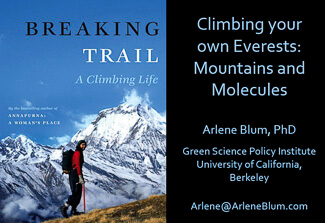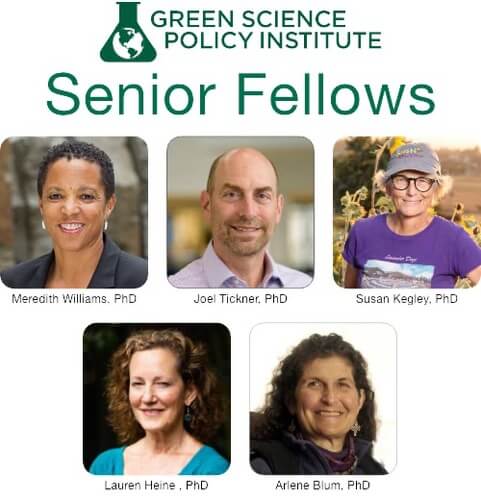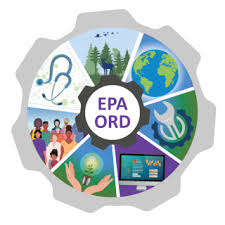April 2025: Wow! Our New Senior Fellows
In this edition:
- Arlene's Inspirational Talk
- Children Exposed to Brain-Harming Chemicals While Sleeping
- Standing Up for Science
- California Safer Soap Act
- Green Science Policy Institute in the News
- Calendar
I am delighted to share some exciting news. Yesterday, on Earth Day 2025, the Green Science Policy Institute launched our Senior Fellows Program to support leading environmental health scientists
and policy experts in developing and implementing new ideas to reduce chemical harm. Joining our Institute for the inaugural year of this innovative program are Meredith Williams, Joel Tickner, Susan Kegley, and Lauren Heine.
Sharing our collective scientific knowledge, years of experience changing chemical policies and practices, as well as our extensive networks, we hope to develop innovative strategies to achieve our Institute's mission: healthier products, people and planet.
“Wow! This initiative will provide the time and space for the most experienced and accomplished among us to address urgent environmental issues facing the world today,” said Habitable CEO Gina Ciganik in response to the launch. “I can’t wait to see the results.”
Learn more about the Green Science Policy Senor Fellows and their proposed projects on our new webpage. Also, please consider commenting and sharing our LinkedIn, Facebook, and/or Bluesky posts with your networks.
Meanwhile, our Institute is having notable successes with our other science and policy programs. We initiated and are providing scientific support for California Assembly Bill 916, The Safer Soap Act, to ban the sale of consumer “antibacterial” hand soaps containing harmful ingredients. According to the CDC, FDA, and a large body of peer-reviewed research, these soaps have no benefit over plain soap, are linked to health harm, and can contribute to antimicrobial resistance. Last month the bill passed the California Environmental Safety & Toxic Materials committee 5-2. It’s headed to the Health Committee next week. If you’re a scientist who would like to endorse the bill, please sign this scientists’ letter.
Last week a study we co-authored finding harmful flame retardants and phthalates in children’s mattresses was published and received wide spread media attention.
We have a long history of helping remove problematic and unnecessary flame retardants from furniture and children’s products and are optimistic this work will prompt manufacturers to eliminate harmful chemicals from mattresses. Already, the UK’s mattress trade association reacted to the study by issuing guidance for its members. Read more about this paper in this Guardian article and the blurb below.
Last month a groundbreaking paper that we helped initiate and coauthored demonstrating that large polymers can break down into smaller more harmful fragments was published in Nature Sustainability. The paper’s policy conclusion was that polymers should be regulated. This month we learned this paper will contribute to efforts in the EU to begin to include the regulation of polymers in a new version of EU toxics regulation expected next year. Another good example of how innovative science can contribute to policy change towards a healthier environment.
Finally, we are looking forward to our three-day-long Six Classes Toxic Reduction Retreat next week with 24 enthusiastic colleagues from the business world, academia, government, and NGOs who share our passion for reducing the use of classes harmful chemicals.
Our major retreat sessions :
1. "Reducing Antimicrobial Harm" in support of the California Safer Soap Act to stop the use of the unnecessary and potentially harmful antimicrobials in consumer soaps
2. "The Polymer Problem" on the science and policy of polymers, why their regulation is needed, and that PFAS polymers should be included in the class of PFAS
3. "The Intersection of Climate and Chemicals” on the problematic petrochemical industry and how reducing carbon use for fuel should not increase its use in plastic and toxics.
4. "Big Idea success stories & How I built it" examples and our own experiences to encourage participants to develop their own Big Ideas towards reduced toxics and a healthier world.
We anticipate innovative ideas, strategies, and future outcomes, which we will share with you in our May newsletter.
Best wishes for a happy spring,
Arlene and the Green Science Policy team
P.S. Get in touch if you might be interested in sharing our lovely North Berkeley office.
Arlene's Inspirational Talk
I have been giving science and policy talks this month for venues around the country including a keynote for a “Women in the Future of Work” symposium at Virginia Tech. Please consider viewing this inspirational keynote here on our Institute’s YouTube channel. We plan to share links to other talks I gave this month at Bioneers and to the Sustainable Furnishing Council in our next newsletter.

Children Exposed to Brain-Harming Chemicals While Sleeping
By Rebecca Fuoco
Babies and young children may breathe and absorb phthalates, flame retardants, and other harmful chemicals from their mattresses while they sleep, according to a pair of peer-reviewed studies led by the University of Toronto and co-authored by our Institute. The studies found concerning levels of these chemicals in children’s bedroom air and confirmed that the likely major source was their mattresses.
The phthalates and organophosphate ester flame retardants measured in this study are hormone disruptors and linked to neurological harms, including learning disorders, reduced IQ scores, behavioral problems, and impaired memory. Children are uniquely vulnerable to exposure, given that they are still developing, have hand-to-mouth behaviors, and have breathing rates ten times higher than adults.
The high levels of flame retardants in most of the mattresses tested were puzzling, given these chemicals are not necessary to pass neither Canadian nor U.S. mattress flammability standards. The researchers call for better regulation and for manufacturers to test for harmful chemicals in children’s mattresses. “This is a wake-up call for manufacturers and policymakers to ensure our children’s beds are safe and support healthy brain development,” says senior author Miriam Diamond.
If you’re a concerned parent, we recommend decluttering your child’s sleeping area by reducing the number of pillows, blankets, and toys. You should also wash and refresh your child’s bedding and bed clothing frequently since these act as a protective barrier to reduce exposure. You can also consider writing to children’s mattress companies to let them know you want products without harmful chemicals.
Standing Up for Science
By Anna Soehl
A recent peer-reviewed Environmental Health Perspectives article by our colleague and PFAS expert Gloria Post documents:
1. PFAS should be regulated as a class
2. Polymer manufacturing can harm public health
This important article tells the story how large quantities of PFAS, known to the fluoropolymer manufacturer to be harmful, were released into New Jersey air and water for decades, while the manufacturer boasted about voluntarily stopping the use of other harmful long-chain PFAS.
This environmental contamination and the known health harms were first identified by a joint study by the currently threatened US EPA Office of Research and Development (US EPA ORD) and the
New Jersey Department of Environmental Protection. In 2020, New Jersey sued the fluoropolymer manufacturer and reached a settlement to pay for cleanup.
Meanwhile, many communities worldwide continue to be unknowingly exposed to PFAS and other harmful chemicals, the price of our broken chemical management system. Still, the chemical industry continues to be allowed to sell chemicals without adequate safety data and the burden of finding harm rests with academic, government, and nonprofit scientists.
To support the important work of independent scientists, please consider contacting your:
- US federal elected officials, informing them about the value of the US EPA ORD, NIH, and other government scientific agencies protecting public health and asking them to "stand up for science."
- National focal points asking to support establishment of the global science-policy panel of chemicals, waste, and to prevent pollution during the June meeting in Uruguay.
California Safer Soap Act
By Rebecca Fuoco
Assembly Bill 916, the Safer Soap Act, would ban the sale of over-the-counter hand soaps and body washes containing three problematic antimicrobials: benzalkonium chloride, benzethonium chloride, and chloroxylenol. On top of their health and environmental hazards, these soaps have no benefit over plain soap in preventing illness. This common-sense legislation will protect people, especially children, from washing with chemicals that could be harmful and contribute to antimicrobial resistance.
In 2016 the FDA issued a final rule banning 19 antimicrobials from consumer soaps, concluding they were neither safe nor effective. However, at the request of manufacturers, the FDA deferred rulemaking for one year on the three antimicrobials. The FDA still has not reached a decision nearly nine years later.
During these years, studies have linked these chemicals to reduced fertility, asthma, skin problems, and neurological problems. These chemicals kill both harmful and beneficial microorganisms, harming our skin and gut microbiomes. Perhaps most concerning is that exposure to these chemicals can result in an increase in antimicrobial resistance, both to the chemicals themselves and important antibiotics. According to the World Health Organization, antimicrobial resistance could cause more deaths than cancer by 2050.
Do these soaps have benefits that outweigh all of these harms? The FDA and CDC say that soaps with these chemicals are no more effective in preventing disease than plain
soap and water.
AB 916 is co-sponsored by Children Now and Women’s Voices for the Earth. We helped originate the bill and are providing scientific support. It has been endorsed by more than 20 other public health and environmental organizations. If you are a California resident and your state assembly representative is a member of the Health committee, please contact them in support of the bill. Also If you’re a scientist who would like to endorse the bill, please sign this scientists’ letter.
Green Science Policy Institute in the News

Below are recent news articles, blogs, podcasts, newsletters, and more that have featured our Institute’s work and expertise.
- The mattress study we co-authored wanscovered by CNN, CBS News, CBC News, Toronto Star, People magazine, The Hill, Consumer Reports, and many more.
- The paper we co-authored finding unregulated polymers break down into smaller toxic chemicals was covered by Inside Climate News, Environmental Health News, The Cool Down, The New Lede, Technology Networks, Earth.com, and more.
- Our latest Forbes column featured pieces on our Material Buyers Club, the polymer loophole, and corporate sustainability.
- An op-ed in The Revelator linked to our information on PFAS in firefighting foams.
- The Cool Down, picked up by Yahoo News, wrote an article about our research on flame retardants in lithium-ion batteries.
- Arlene was interviewed by the radio station KPFA.
Calendar
May 7, 2025, 7 to 8:30PM Pacific:
Berkeley City Club - Arts & Culture Lecture Series
2315 Durant Ave., Berkeley California
Arlene Blum will present "From Mountains to Molecules: Tackling Toxics To Protect People and Our Planet."
Register here.
May 17 & 18, 2025:
Annual Berkeley Himalayan Fair
Live Oak Park, 1300 Shattuck Avenue at Berryman, North Berkeley.
Enjoy the food, music, dance, crafts and arts of the Himalayas at this fun free cultural event which began in 1983.
Contact Arlene if you would like to volunteer to help at the Fair or at her booth under the big tree across from the entertainment stage. More information here.
Receive Updates By Email
Subscribe to our monthly newsletter and get these updates delivered right to your inbox!




